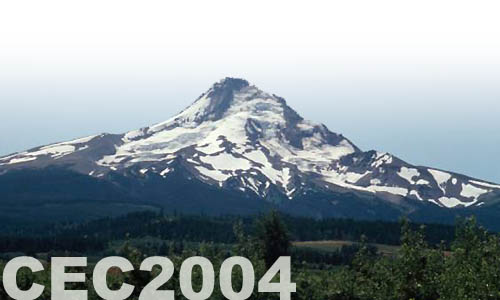
Swarm Intelligence
Congress on Evolutionary Computation, Portland, Oregon (U.S.A.) from 20-23 June 2004
Organizers:
Dr. Yuhui Shi (EDS-Engineering
and Manufacturing Services, USA)
Prof. Russ Eberhart and Xiaohui
Hu (Purdue School of Engineering and
Technology Indianapolis, USA)
Dr. Xiaodong Li (RMIT
Unviersity, Australia)
Dr. Hussein A. Abbass (Australian
Defence Force Academy, Australia)
Important dates ()
Submission:
February 10, 2004
Notification: March
2, 2004
Camera-Ready: March
21, 2004
Conference: June 20-23,
2004

 Swarm
Intelligence (SI) is an Artificial Intelligence technique involving
the study of collective behaviour in decentralized systems. Such systems
are made up by a population of simple agents interacting locally with one
other and with their environment. Although
there is typically no centralized control dictating the behaviour of the
agents, local interactions among the agents often cause a global pattern
to emerge. Examples of systems like this can be found in nature, including
ant colonies, bird flocking, animal herding, honey bees, bacteria, and
many more. Swarm-like algorithms, such as Particle Swarm Optimization (PSO)
and Ant Colony Optimization (ACO), have already been applied successfully
to solve real-world optimization problems in engineering and
telecommunication. SI models
have many features in common with Evolutionary Algorithms. Like EA, SI
models are population-based. The system is initialized with a population
of individuals (i.e., potential solutions).
These individuals are then manipulated over many iteration steps by
mimicking the social behaviour of insects or animals, in an effort to find
the optima in the problem space. Unlike EAs, SI models do not explicitly use evolutionary
operators such as crossover and mutation. A potential solution simply
‘flies’ through the search space by modifying itself according to its
past experience and its relationship with other individuals in the
population and the environment.
Swarm
Intelligence (SI) is an Artificial Intelligence technique involving
the study of collective behaviour in decentralized systems. Such systems
are made up by a population of simple agents interacting locally with one
other and with their environment. Although
there is typically no centralized control dictating the behaviour of the
agents, local interactions among the agents often cause a global pattern
to emerge. Examples of systems like this can be found in nature, including
ant colonies, bird flocking, animal herding, honey bees, bacteria, and
many more. Swarm-like algorithms, such as Particle Swarm Optimization (PSO)
and Ant Colony Optimization (ACO), have already been applied successfully
to solve real-world optimization problems in engineering and
telecommunication. SI models
have many features in common with Evolutionary Algorithms. Like EA, SI
models are population-based. The system is initialized with a population
of individuals (i.e., potential solutions).
These individuals are then manipulated over many iteration steps by
mimicking the social behaviour of insects or animals, in an effort to find
the optima in the problem space. Unlike EAs, SI models do not explicitly use evolutionary
operators such as crossover and mutation. A potential solution simply
‘flies’ through the search space by modifying itself according to its
past experience and its relationship with other individuals in the
population and the environment.
This special session will highlight the latest development in this rapidly growing research area of Swarm Intelligence. Authors are invited to submit their original and unpublished work in the areas including (but not limited to) the following:
- Particle swarm optimization
- Ant colony optimization
- Artificial life
- Culture algorithm
- Ecologically inspired models
- Other nature-inspired computation techniques
- Multi-objective optimization
- Constrained optimization
- Scheduling
- Real world applications
Submission (Updated 21 January 2004)
You should follow the instructions of the CEC 2004 paper submission guidelines, and submit your paper directly via this website for review.
Make sure you select "Si Y. Shi, X.Li, R.Eberhart, X.Hu and H.A. Abbass: Swarm Intelligence", under the "Main research topic*".A submission should not be over 8 pages. This includes all figures, tables, graphs, photos, and bibliography entries. Extra pages may be purchased at US$100 each. Special session papers are treated the same as regular conference papers, and will be included in the conference proceedings. Please double check the as-printed appearance of your paper before sending it.
Organizers:
Yuhui Shi (yuhui.shi@eds.com)
EDS-Engineering and Manufacturing Services 1401 E. Hoffer St.
Kokomo, IN 46902, USA
Russ Eberhart (reberhar@iupui.edu) and Xiaohui Hu (xhu2@iupui.edu)
Purdue School of Engineering and Technology Indianapolis, Indiana 46206,
USA
Xiaodong Li (xiaodong@cs.rmit.edu.au)
School of Computer Science and Information Technology
RMIT University, VIC 3001, Melbourne, Australia
Hussein A. Abbass (abbass@cs.adfa.edu.au)
School of Computer Science
University College, Australian Defence Force Academy
University of New South Wales, Canberra, ACT 2600, Australia
James Kennedy (US Department of Labour, USA)
Russ Eberhart (Purdue School of Engineering and Technology Indianapolis, USA)
Yuhui Shi (EDS-Engineering and Manufacturing Services, USA)
Jonathan Fieldsend (University of Exeter, UK)
Gerry Dozier (Auburn University, USA)
Konstantinos E. Parsopoulos (University of Patras, Greece)
Eleni Laskari (University of Patras, Greece)
Michael N. Vrahatis (University of Patras, Greece)
Hitoshi Iba (University of Tokyo,Japan)
George Magoulas (Brunel University, UK)
Marcus Randall (Bond University, Australia)
Xiaohui Hu (Purdue School of Engineering and Technology Indianapolis, USA)
Hussein A. Abbass (ADFA, UNSW, Australia)
Antony
Iorio (RMIT University, Australia)
Xiaodong
Li (RMIT University, Australia)